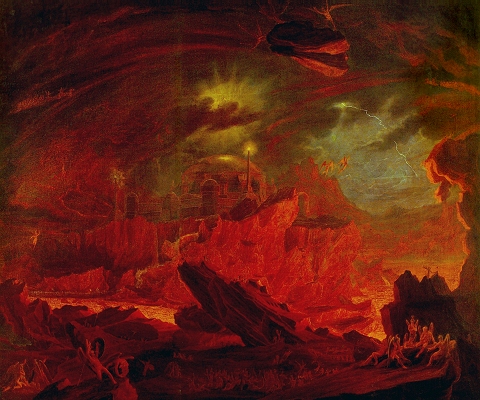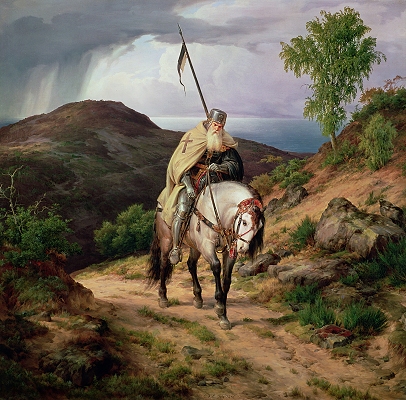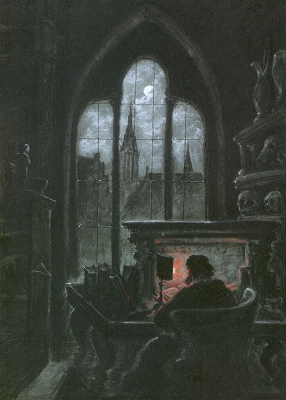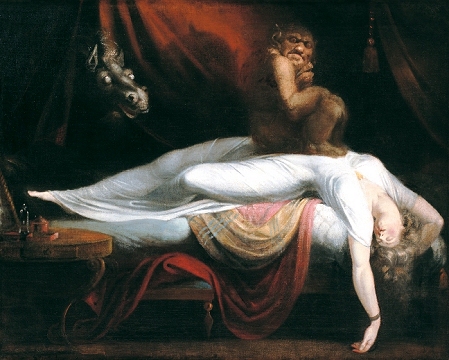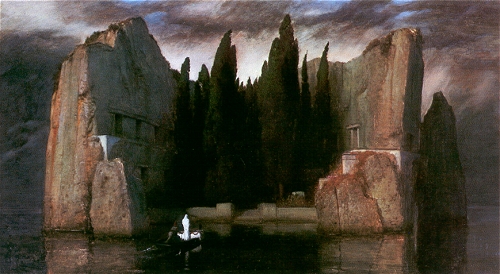
DONICA
Robert Southey
In Finland there is a castle which is called the New Rock, moated about with a river of unfounded depth, the water black, and the fish therein very distasteful to the palate. In this are spectres often seen, which foreshew either the death of the Governor, or some prime officer belonging to the place; and most commonly it appeareth in the shape of an harper, sweetly singing and dallying and playing under the water.
It is reported of one Donica, that after she was dead, the Devil walked in her body for the space of two years, so that none suspected but that she was still alive; for she did both speak and eat, though very sparingly; only she had a deep paleness on her countenance, which was the only sign of death. At length a Magician coming by where she was then in the company of many other virgins, as soon as he beheld her he said, "fair Maids, why keep you company with the dead Virgin whom you suppose to be alive?" when taking away the magic charm which was tied under her arm, the body fell down lifeless and without motion.
The following Ballad is founded on these stories. They are to be found in the notes to "The Hierarchies of the blessed Angels," a poem by Thomas Heywood, printed in folio by Adam Islip, 1635. [Southey's note]
High on a rock, whose castled shade
Darken'd the lake below,
In ancient strength majestic stood
The towers of Arlinkow.
The fisher in the lake below
Durst never cast his net,
Nor ever swallow in its waves
Her passing wings would wet.
The cattle from its ominous banks
In wild alarm would run,
Tho' parched with thirst and faint beneath
The summer's scorching sun.
For sometimes when no passing breeze
The long lank sedges waved,
All white with foam and heaving high
Its deafening billows raved;
And when the tempest from its base
The rooted pine would shake,
The powerless storm unruffling swept
Across the calm dead lake.
And ever then when death drew near
The house of Arlinkow,
Its dark unfathom'd depths did send
Strange music from below.
The Lord of Arlinkow was old,
One only child had he,
Donica was the Maiden's name
As fair as fair might be.
A bloom as bright as opening morn
Flush'd o'er her clear white cheek,
The music of her voice was mild,
Her full dark eyes were meek.
Far was her beauty known, for none
So fair could Finland boast,
Her parents loved the Maiden much,
Young EBERHARD loved her most.
Together did they hope to tread
The pleasant path of life,
For now the day drew near to make
Donica Eberhard's wife.
The eve was fair, and mild the air,
Along the lake they stray;
The eastern hill reflected bright
The fading tints of day.
And brightly o'er the water stream'd
The liquid radiance wide;
Donica's little dog ran on
And gambol'd at her side.
Youth, health, and love bloom'd on her cheek,
Her full dark eyes express
In many a glance to Eberhard
Her soul's meek tenderness.
Nor sound was heard, nor passing gale
Sigh'd thro' the long lank sedge,
The air was hushed; no little wave
Dimpled the water's edge.
Sudden the unfathom'd lake sent forth
Strange music from beneath,
And slowly o'er the waters sail'd
The solemn sounds of death.
As the deep sounds of death arose,
Donica's cheek grew pale,
And in the arms of Eberhard
The senseless maiden fell.
Loudly the youth in terror shriek'd,
And loud he call'd for aid,
And with a wild and eager look
Gazed on the death-pale maid.
But soon again did better thoughts
In Eberhard arise,
And he with trembling hope beheld
The maiden raise her eyes.
And on his arm reclin'd she moved
With feeble pace and slow,
And soon with strength recover'd, reach'd
The towers of Arlinkow.
Yet never to Donica's cheek
Return'd the lively hue,
Her cheeks were deathy white, and wan,
Her lips a livid blue.
Her eyes so bright and black of yore
Were now more black and bright,
And beam'd strange lustre in her face
So deadly wan and white.
The dog that gambol'd by her side,
And lov'd with her to stray,
Now at his alter'd mistress howl'd
And fled in fear away.
Yet did the faithful Eberhard
Not love the maid the less;
He gazed with sorrow, but he gazed
With deeper tenderness.
And when he found her health unharm'd
He would not brook delay,
But press'd the not unwilling maid
To fix the bridal day.
And when at length it came, with joy
They hail'd the bridal day,
And onward to the house of God
They went their willing way.
And as they at the altar stood
And heard the sacred rite,
The hallowed tapers dimly stream'd
A pale sulphureous light.
And as the youth with holy warmth
Her hand in his did hold,
Sudden he felt Donica's hand
Grow deadly damp and cold.
And loudly did he shriek, for lo!
A Spirit met his view,
And Eberhard in the angel form
His own Donica knew.
That instant from her earthly frame
Howling the dæmon fled,
And at the side of Eberhard
The livid form fell dead.
1797
(Illustration is Arnold Böcklin, The Isle of the Dead, 1883.)
